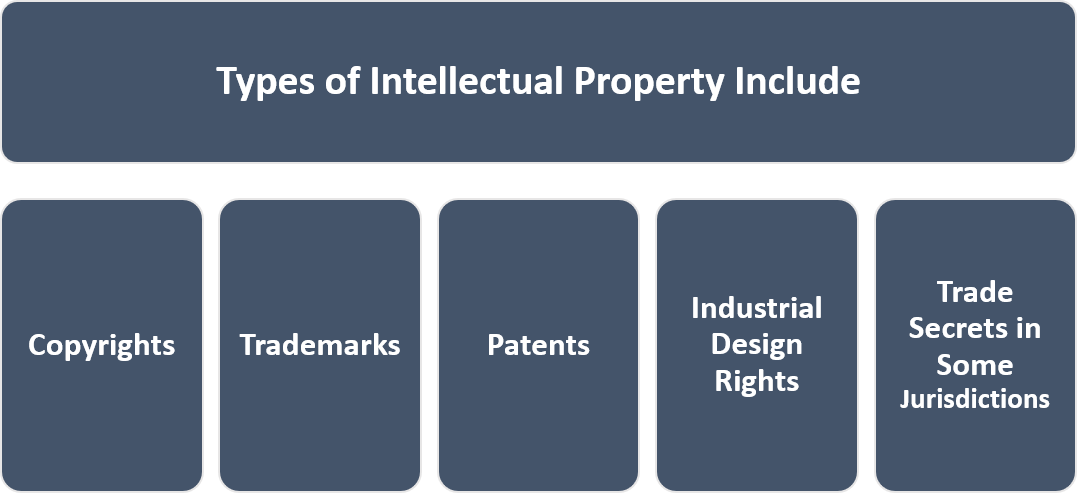Intellectual property (IP) is a term referring to a number of distinct types of creations of the mind for which property rights are recognised and the corresponding fields of law. Under intellectual property law, owners are granted certain exclusive rights to a variety of intangible assets, such as musical, literary, and artistic works; discoveries and inventions; and words, phrases, symbols, and designs.

Intellectual property rights are the recognition of a property in an individual creation. The establishment of intellectual property rights represents a trade-off, to balance the interest of society in the creation of goods (by encouraging their production) with the problems of monopoly power. Since the trade-off and the relevant benefits and costs to society will depend on many factors that may be specific to each product and society, the optimum period of time during which the temporary monopoly rights should exist is unclear. When trade secrets, e.g. scientific or engineering secrets, are stolen, corporations lose their competitive edge, small entities cease to exist, and whole sectors of the economy weaken and fall behind in the global marketplace. People lose their livelihood and their children’s futures.
The threats of economic espionage, intellectual property theft, counterfeiting and piracy are global, dangerous and increasingly common. It is within your power to decide for yourself if your enterprise is going to be a hard target or soft target. It is important to invest in protective measures commensurate to the value of the asset being protected. Here are some recommendations for a comprehensive program.
Organisation - Security reports within an organisation are important. Consider appointing a chief security officer, who reports to either the chief executive office or the chief financial officer. This person should hold the reins of personnel security, physical security and information security, and should not be a stranger to the board room.
Awareness and Education - Educate your workforce on an ongoing basis about the threats of economic espionage, intellectual property theft, counterfeiting and piracy. Help them understand your expectation that they will protect the enterprise’s intellectual property and, by extension, their own livelihood. Provide general education for the entire workforce, and specialized education for executives, managers, technical personnel, etc.
Personnel Security - Implement a “Personnel Security” program that includes both background investigations and termination procedures. You need policies that establish checks and balances, and you need to enforce them. Know the people you are going to hire. Don’t lose touch with them while they work for you. Consciously manage the termination process if and when they leave the enterprise.
Information Security - Recruit certified information security professionals. Adopt best practices and establish a baseline. Utilize appropriate information security technologies, such as firewalls, intrusion detection, encryption, strong authentication devices, etc. Pay attention to data retention and data destruction as well as data access.
Physical Security - It is pointless to invest in information security, or commit to background investigations, if agents of an unscrupulous competitor or a foreign government can simply walk away with what they covet.
Intelligence - You need both business and security intelligence. Know your competition, your partners and your customers. Research the market environment. Keep abreast of the latest trends in hacking, organized crime, financial fraud and state-sponsored economic espionage. You can outsource this expertise. But someone must be looking at both streams of intelligence, with the particulars of your enterprise in mind.
Industry Outreach - Actively participate in industry working groups appropriate to your sector and environment. Talk with your peers about the types of attacks or threats they are encountering.
Government Liaison - Use threat information from law enforcement, foreign ministries, elected officials, regulatory and trade organisations in South Africa, and in other countries where you conduct business.
Legal Strategies - Realise that even when right is on your side, a market may be lost to you, and protecting a portion of the market is sometimes a viable survival strategy. Litigation is not the solution; it is confirmation that intellectual property theft has occurred. Work to protect your intellectual property and avoid the costs associated with litigation. Don’t let a small legal mind make decisions about big legal issues. Get expert legal advice on intellectual property issues.
Click here to view a explanation about what intellectual property is.